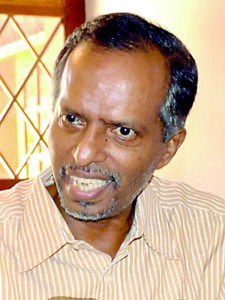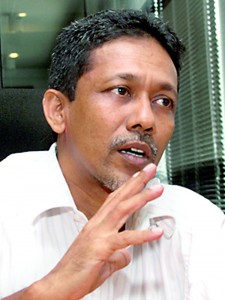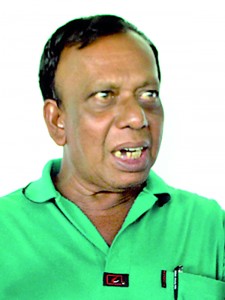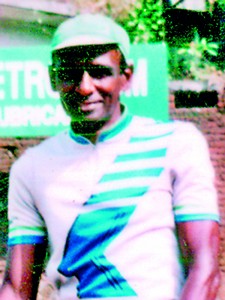Pedalling down the wrong lane
Amal Suriyage (Former cycling official)
In the ’60s it was the upper middle class who was involved in cycling. They had a lot of enthusiasm and they had the means to do it. And you need the means to do it. A bicycle can be a poor man’s mode of transport but when it comes to doing the sport it is an expensive business. The Tour de Lanka made the first collapse.
Tour de Lanka was one of the most famous events in Sri Lanka. Usually it had a racing event and racing is the international event, which is the Olympic event, which is the World Championships. When you move the Tour de Lanka from a racing category to a standard category what usually happens is it brings standards down. You need Olympic standards for the sport to progress. So I think Tour de Lanka made a mistake. The racing category was cornered and the standard category, which is the village lads’ event, was given more emphasis to make it the poor man’s sport. But this sport is expensive. Equipment is expensive. A race bike with carbon fibre material will be at least 1.5 million. A normal village lad cannot afford this. If you want to reach the South Asian standard you need the bike. At least 40 percent of the effort at a race comes from the bike. So shifting the emphasis from those who could afford to properly participate in the sport deteriorated it. Then the schools association only catered to the standard event when it came to the school association nationals. If you want to bring riders into the international arena, you cannot have a standard event as the cycling nationals because it is from the schools only that you can bring up young people to participate in this sport. So that was another mistake.
We are still trying to be competitive internationally after having the sport for the last 40 years or so. Up to now we have not had an Olympic squad. I think corruption is rampant. You can’t think about yourself, you can’t think about power, you only empower those who are in the sport. This is not happening. But the people of the Interim Committee are stooges of the politicians. When you are in an Interim Committee you become a stooge because you can only say, ‘Yes sir.’ If you are only looking after your wellbeing how can you service the sport? Now it has become about giving a little and taking a lot, so you can’t run an association like that. We have come down by about 10-15 years.
To develop the sport we must also have a calendar of events that are national and international. We should have national championships for Under 23, Under 19 for girls, boys and veterans and so on and so forth. Also there is no proper welfare and they only get a prize when they win and until then they have no proper training, no proper nutrition, no coaching. We need to develop each and every rider’s capability. But we don’t even have a national coach. The riders don’t even get 2000 dollars a year and most of them are in the forces and when you are in the forces you only develop rank. You don’t get any other benefits. There should also be a market plan; there is so much mileage you can give your sponsors. Most sponsors will come one year and leave the next because things are disorganized.
Nishantha Piyasena (Cycling Interim Committee member)
The standards are good but the participation is less. At the moment we face many challenges to overcome in order to see more participation. Right now cycling is under an Interim Committee. For a sport to be developed you need a proper national federation; this is very convenient otherwise you can’t promote the game. If you have a proper national body you don’t have to go here and there to find out anything. But at the moment the Interim Committee is also doing well and trying its best to do something. But more participation comes with popularity. You have to go outside of Colombo.
Now if you consider cycling we have a good opportunity for that. But at the moment participation is very limited because there are few facilities. The Army, Navy, Air Force, Police and Ports Authority are the leading clubs who can provide facilities for the riders. Other private clubs cannot do this so most of the players are attached to the forces. But I think we have to look at the civil clubs and encourage them so for this we need to have a proper plan which will help them benefit. From 2007 to 2009 we had a very good development programme with one of the leading radio channels and we covered the whole country by using that talent search programme and we gave each and every district one talent search programme. Then we organised a district level race and gave an opportunity to new and elite riders taken from the programme to take part. So at that point we had level 1 and level 2 riders. But in 2010 one party went to the courts and got an injunction on the AGM. They went and got it and the case was going on for two years. Now the person who filed the case has withdrawn it. This has damaged the sport. So due to this the minister had to create an Interim Committee. But my view is that if you have any problem you can go to court on personal grounds without putting this game in danger.
The reason we have gone down in cycling internationally is due to several reasons. There was an incident in 1994 when cyclists disappeared in Japan. We didn’t get any opportunity to go overseas after that because we didn’t get any visas. Nobody wanted to invite Sri Lankan teams. In 2006 I had to go to the minister to get the visa for Thailand and he refused. Another reason was the war. This is a sport where you need to have access to public roads so during the war time we had a lot of trouble getting permission from the police and Ministry of Defence. We had a very tough time trying to organize events. And also when a sport like cycling had these kinds of problems other sports like cricket came up and sponsors and the media all went after that sport. But we can still do well at the South Asian level; the next step is the Asian level. This is one of the biggest challenges. Countries like Korea and Japan are there and they use a lot of technology so we have to compete with that technology. So it is not an easy sport to take part in because a bicycle costs about one million. The main thing is we need to have a proper administrative flow. Interruption is a disaster to the sport. Two or three times we have had court cases. My personal opinion is the governing body should act for four years. Otherwise if you have elections every year and one party is appointed then they have hardly ten months to do anything.
Sunil Abhayawardana (Veteran Sports Journalist)
I have been a correspondent in cycling in Sri Lanka for over 30 years now. There is a serious drawback in cycling compared to the yesteryears. One of the main setbacks is the lack of well organised races. Today we have competitions but these races cannot be  branded as quality ones. The most prestigious race was the Tour de Lanka, a race that not only top cyclists but all who were engaged in the sport were eagerly looking forward to take part. But today we can see only a handful of quality races being conducted. Some races are conducted by sponsors for their own benefit but end of the day the competitors are the ones who are misled. This has been a serious aspect in failing to produce skilled competitors.
branded as quality ones. The most prestigious race was the Tour de Lanka, a race that not only top cyclists but all who were engaged in the sport were eagerly looking forward to take part. But today we can see only a handful of quality races being conducted. Some races are conducted by sponsors for their own benefit but end of the day the competitors are the ones who are misled. This has been a serious aspect in failing to produce skilled competitors.
Earlier competitions were galore for women as well. But nowadays only a handful is being held and as a result the number of women competitors has gone down. One of the serious setbacks as I observe is the lack of coordination between officials and competitors nowadays. Earlier officials were seriously concerned about players and their well being. The main problem I see here is the governance of an interim body to run cycling in Sri Lanka.
Any country would like to have a duly elected governing body in any sport. But cycling for many years has been run by an interim committee, which at times even the players failed to identify. This has offered a lot in pulling down cycling in Sri Lanka to its current state, which is appalling.
In a way it doesn’t matter if a sport is being governed by a set of officials who form an interim body. But they should at least have experience in the sport. But in cycling this has not been the case. The officials appointed to the interim bodies during the past years and now do not have the basic knowledge to run the show. To the least they have not possessed the capability in at least coming out with a plan that could held cycling in Sri Lanka prosper. The best example that could be given in this regard is the failure of the cycling officials to conduct the Nationals. After a lapse of many years this time it was conducted because a district cycling federation made the initiative and the cycling hierarchy had to oblige as they did not possess the capability of handling such a big event. All these setbacks have led only cyclists in being dejected and the sport running into dreadful standards. There is a grading process, but end of the day the cyclists do not benefit from it in any way, nor do they get international exposure, leave aside the requirement of a proper development structure. As far as I’m concerned majority of the Sri Lankan cyclists are not happy of what is happening to their sport. Also cycling is wholly dominated by armed forces nowadays. There were number of top cycling clubs those days but now none of them are active for reasons better known to them. This is evident by the lack of spectators to witness a cycling race. Those days a cycling race was a glamorous event where spectators were involved in thousands. This is not a conducive situation.
The basic need of the hour is an appropriately appointed cycling federation which needs to have well experienced administrators and former cyclists, so different views can come along and benefit the sport. In addition they (officials) should come out with comprehensive plans to the development of the sport, its main stakeholders the cyclists and an effective administrative structure. Nowadays many of the cyclists lack technical knowledge and to add fuel to it, most of the present officials too are not aware of cycling. This should change for good. We need more workshops for cyclists, officials and administrators besides conducting competitions very often. In addition cycling must be populalrised among the general public. State support is also an essential aspect to develop cycling nowadays.
You cannot expect changes to happen overnight. Changes can happen gradually and made permanent when shrewd individuals take over the administration. Developments also should be made according to the times and to match with the world. All stakeholders should respect each other and their views, for the betterment of the sport. The focal point here is, correct people should be appointed to the positions of the federation, or else cycling will only reach the hollow end.
A.M. Sumanaweera (Former cycling national champion)
I have been competing at top level competitions in Sri Lanka since 1965. As newcomers we were highly anticipating the then famous Tour de Lanka, which was the premier cycling rally those days. It was a great achievement to compete and complete this race for us. And back at home in Ratnapura, we were treated as heroes upon returning from the Tour de Lanka rally. By competing at this race I became famous, this was before I went on to win the event for many years. People knew us, people loved cycling and the sport had great recognition those days. But today the situation is pathetic. Even if a cyclist wins a big event nobody really cares.
At present we see a total domination of armed forces in cycling, be it at competitions or the administration. The armed forces teams have big teams and in a way this has forced other clubs, some leading, in dire states. I have personally witnessed that cyclists from armed forces block the ways of other cyclists at races so their members could win it. This is not sportsmanship. Appalling standard of administration is responsible for this kind of situation in a way. These teams claim that they are helping cyclists and cycling by recruiting them in big numbers. But there’s a bad side of it which they don’t see.
If these teams go on hunting for quantity, unknowingly they are responsible in bringing down the quality of the cycling. Other clubs from the rest of Sri Lanka will not have the capability of producing good cyclists because they are grabbed by these teams, namely the Army, Navy and Air Force. If the situation is such how will the riders from villages reach the top? They will only be hunted by others and from there they will become technically poor riders.
As a schoolboy I used to cycle from my home to school and back. We had the passion for cycling those days. And with what is taking place, we can only dream of seeing cyclists with enthusiasm and commitment. Those who are responsible have turned cycling a business today. It is evident with the number of junior riders available in the country now. I can proudly boast that I was a schoolboy when I competed in the Tour de Lanka race. Nowadays schoolboys competing at top level is a rare occurrence. You can easily judge the development of cycling in Sri Lanka. It has only reached the rags.
I also don’t see anything positive coming out from the cycling federation officials, which is apparently an interim body for many years. And also those who in the interim committee do not seem to have any sort of experience in cycling. This is a real setback in terms of cycling. Why I say that is, one needs to be oriented with cycling and its technical aspects, so it will make life easy for the administrators. But this disadvantage has hit cycling in a big way. It is fine to have total outsiders as the president and the secretary of cycling federation but former cyclists should fill the remaining slots in the governing body. Today I don’t see cycling being benefited from its former stalwarts. They are totally sidelined. Instead outsiders with personal agendas have dominated the cycling federation.
With my experience of over 40 years in cycling I think all parties need to put aside differences and work towards a single goal, which should be the development of the sport. It’s very simple to popularise cycling but you need the expertise of former cyclists to do that. As the situation has gone to an extreme where it needs state interference, I think it’s high time that the government steps forward and put things back in order.
We also don’t see races being conducted very often unlike yesteryears. Cycling needs more competitions, at least one for each month. After sorting out four of the top races, the administrators should find proper and longstanding sponsors to conduct event in the remaining eight months. This way we could rank the cyclists and categorise them. This programme should be continued for some time until, the cycling federation comes to a term where it can identify its cyclists and send them to international races, based on their rankings. Also there should be a permanent remedy to the club mafia, where we nowadays see the armed forces field over 40 cyclists in order to win a race, while thwarting competitors from other clubs. My view is that each team should be given the opportunity to field only eight riders per race. It will enhance the race and its standards with the help of the experts. And it will help produce skilled and technically perfect competitors.

Pic courtesy SLAF
Interviews by Naushad Amit and David Stephens and pix by Amila Gamage, Mangala Weerasekera and Indika Handuwala
comments powered by Disqus

